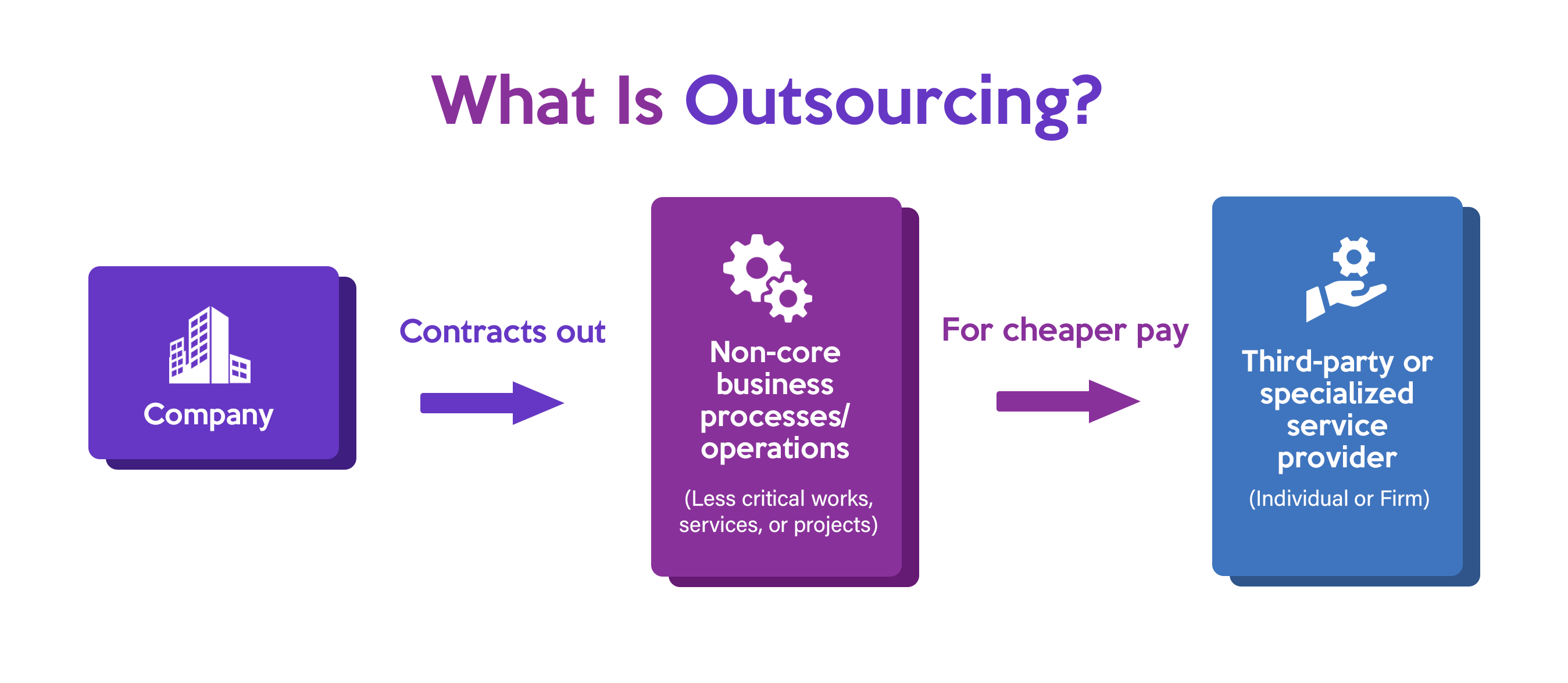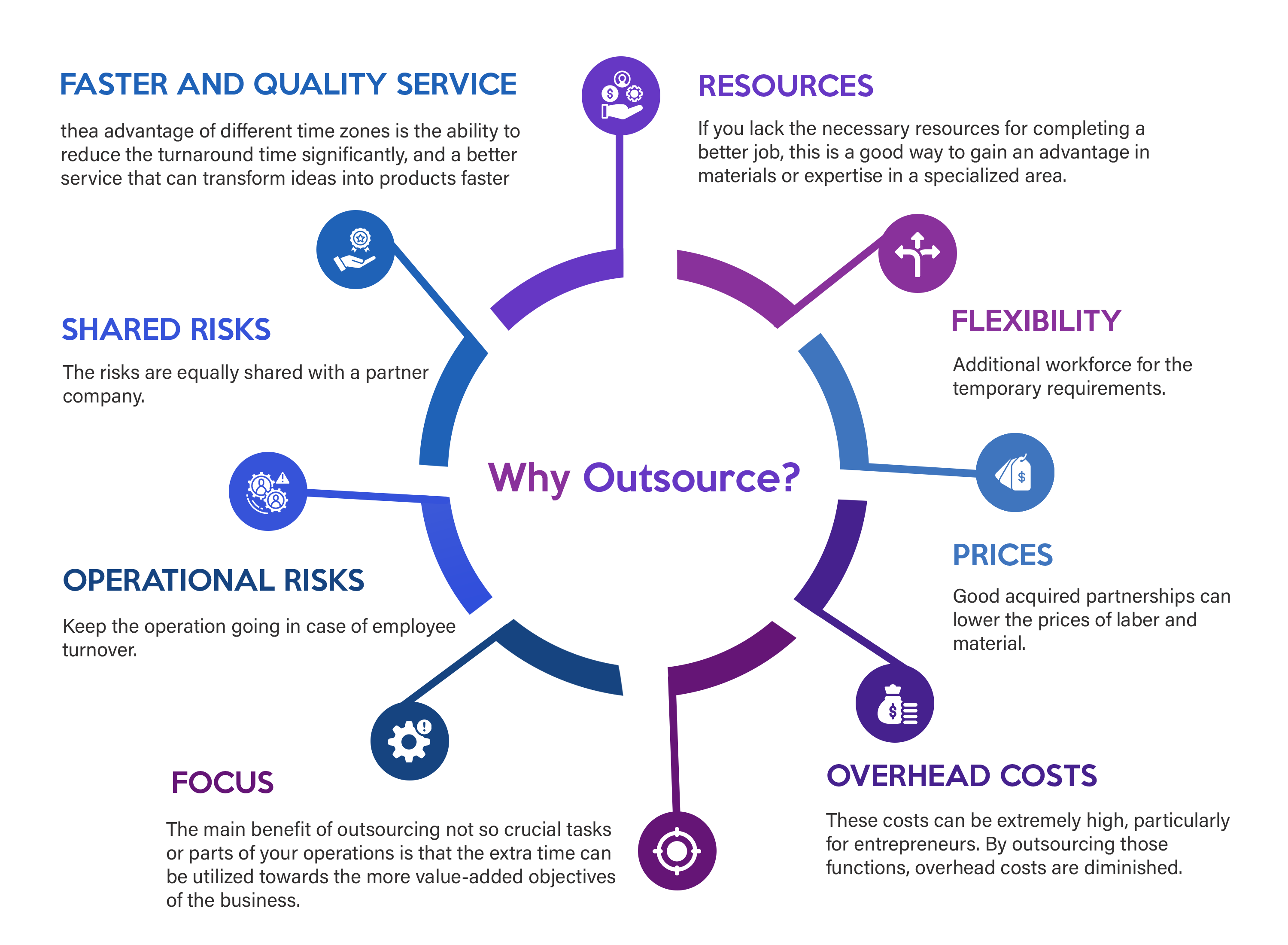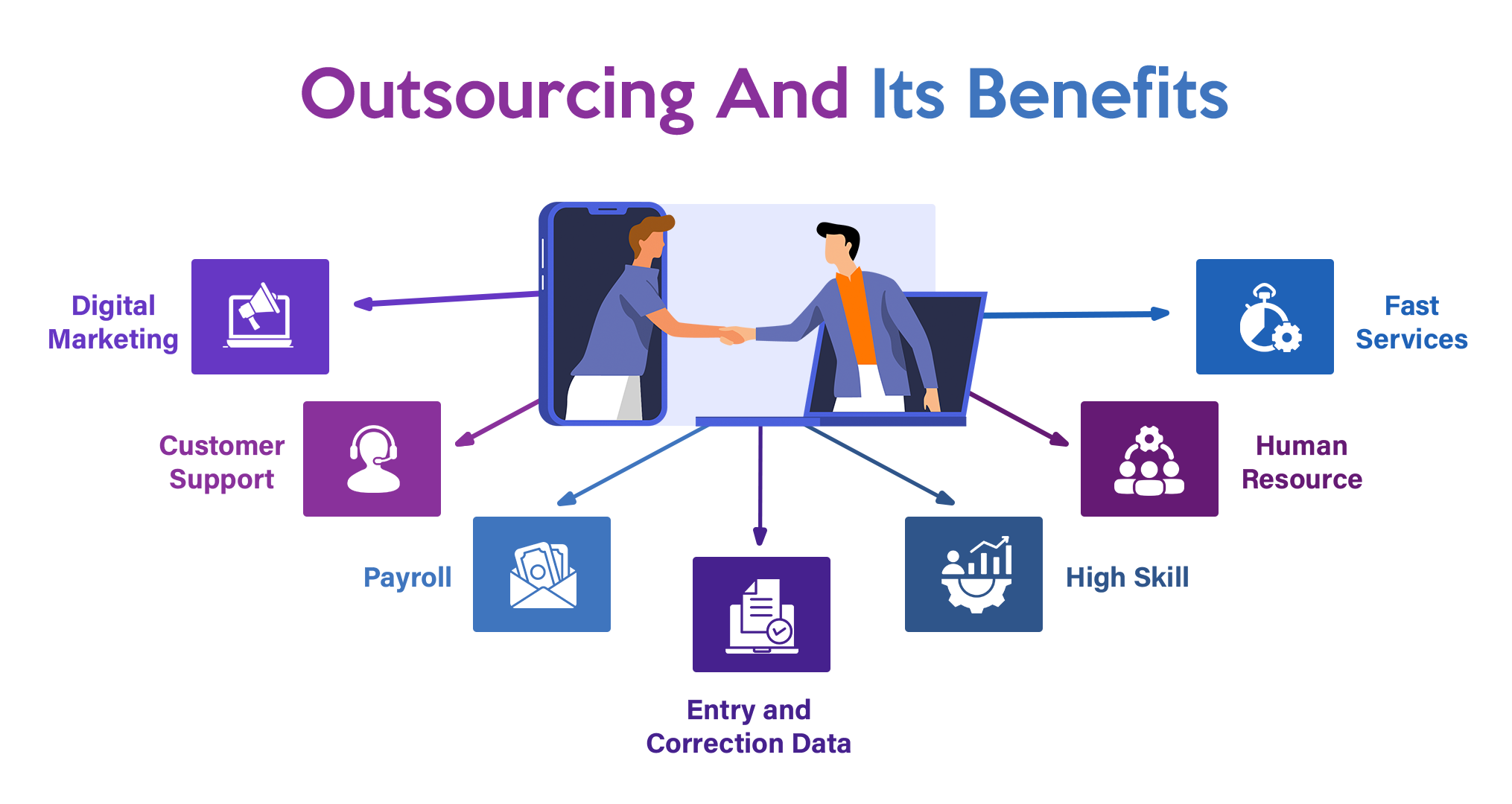Outsourcing has become a popular practice among businesses worldwide, as it allows them to delegate specific tasks to specialized third-party service providers. Digital agencies, in particular, are reaping the benefits of outsourcing, as it helps them focus on their core competencies while maintaining a high level of efficiency and quality in their service delivery.
This article delves into the reasons behind the growing trend of outsourcing in digital agencies and how it contributes to their success.
What Is Outsourcing?

Outsourcing is a business practice that involves contracting out specific tasks, functions, or services to a third-party provider instead of handling them internally. This approach allows businesses to access specialized expertise, reduce operational costs, and increase flexibility in managing their resources. It is particularly useful for digital agencies, as they often require a diverse set of skills and expertise to deliver their services effectively, including digital marketing, SEO, content creation, and web development.
The Rise of Digital Agencies
With the rapid growth of the digital landscape, businesses are increasingly turning to digital agencies with digital marketing team to help them navigate the complexities of the online world. Digital agencies specialize in a wide range of services, such as web development, digital marketing, social media management, and search engine optimization (SEO). These agencies work with clients to create and execute strategies that help them achieve their online goals, increase brand visibility, and drive customer engagement.
Benefits of Outsourcing for Digital Agencies

Outsourcing can provide digital agencies with numerous advantages, including increased focus on core competencies, cost savings, access to specialized expertise, scalability, and improved quality of services. In the following sections, we will discuss each of these benefits in more detail, with an emphasis on digital marketing and SEO.

Increased Focus on Core Competencies
Enhancing core services and offerings
The practice of outsourcing non-core functions provides digital agencies with an effective means of refocusing their internal resources on the areas they excel in, which typically encompass key sectors like strategic planning, inventive design, digital marketing, and Search Engine Optimization (SEO). By delegating tasks that do not fall directly within these critical competencies to external professionals, these agencies can free up substantial time and human resources. This increased availability of resources can be channeled back into the agency’s primary functions.
Consequently, with more time and resources available, digital agencies can immerse themselves deeply into refining and expanding their central offerings. It is akin to a master craftsman dedicating more time to perfecting his craft, bringing every ounce of his creativity, innovation, and skill to the table. The same is applicable for digital agencies concentrating on core areas such as digital marketing and SEO; the more focused time and effort they invest, the greater their expertise grows.
A direct beneficiary of this increased dedication and enhanced service quality is the agency’s client base. When agencies better their core offerings, the quality of work they deliver to their clients improves significantly. Clients can experience a noticeable difference in the level of strategic planning, creativity in design, the effectiveness of digital marketing campaigns, and the performance of SEO strategies. Ultimately, by adopting the practice of outsourcing non-essential functions, digital agencies can provide superior services that can lead to remarkable results for their clients, bolstering client satisfaction and loyalty.
Streamlining internal operations
When digital agencies opt to outsource non-essential tasks, they free up valuable time and resources to sharpen their focus on their core areas of expertise. This strategic decision empowers them to invest greater effort and attention in vital aspects such as strategy development, creative design, digital marketing, and search engine optimization (SEO). As a consequence, these agencies can elevate their core offerings to new heights, thereby setting the stage for improved outcomes and enhanced value for their esteemed clients.
By delegating peripheral functions to external partners or service providers, digital agencies can streamline their internal operations. This streamlining process not only boosts overall efficiency but also enables agencies to optimize their resource allocation. As a result, they can channel their human capital, financial resources, and technological assets toward their primary domains of specialization. This focused approach fosters an environment where agency professionals can delve deeper into refining their core competencies, uncovering innovative solutions, and staying at the forefront of the rapidly evolving digital landscape.
Moreover, by outsourcing non-core functions, digital agencies can tap into a vast network of specialized talent and industry expertise. These external professionals bring diverse skill sets and extensive knowledge to the table, allowing agencies to harness their collective power for the benefit of their clients. Whether it’s leveraging the skills of seasoned SEO specialists, collaborating with digital marketing experts, or accessing creative designers, outsourcing enables agencies to assemble a multidisciplinary team that can excel in various domains. The infusion of this diverse expertise further strengthens the agency’s ability to deliver comprehensive and cutting-edge solutions, meeting and exceeding client expectations.
Cost Savings
Reduced labor costs
One of the main benefits of outsourcing is the potential for significant cost savings. By working with third-party providers, digital agencies can access specialized skills and expertise at a lower cost than hiring full-time employees. This is especially beneficial for small and medium-sized agencies, as it allows them to compete with larger firms without incurring excessive overhead costs. In the realm of digital marketing and SEO, this could mean outsourcing tasks such as keyword research, link building, or content creation to specialized providers.
Lower infrastructure and operational expenses
Opting to outsource also significantly mitigates the requirement for digital agencies to allocate substantial funds towards the development and maintenance of infrastructure, as well as other operational expenditures that come with nurturing an in-house team. Such expenses can encompass a range of costs, including the acquisition and upkeep of office space, procuring the necessary equipment and technologies, ensuring relevant software licenses are up-to-date, and providing comprehensive employee benefits.
When digital agencies outsource, they transition from having to handle these diverse expenses to focusing more on their core competencies. By doing so, they are able to reduce their operational costs dramatically. This reduction is not merely about saving money, but also about strategic resource allocation. With less capital tied up in infrastructure and overheads, digital agencies can reinvest these savings into areas that directly impact their service quality and business growth.
In essence, outsourcing becomes an effective strategy to optimize operational costs while increasing resource efficiency. It allows digital agencies to steer clear from substantial financial commitments associated with internal team management and instead direct these resources towards areas that foster innovation, improve service delivery, and enhance client satisfaction. Thus, outsourcing is not just a cost-saving measure, but a strategic move towards efficient resource allocation and optimized business operations.
Access to Specialized Expertise
Diverse skill sets and knowledge
Digital agencies often require a broad range of skills and expertise to deliver their services effectively. Outsourcing enables these agencies to access specialists in various fields, such as web development, content creation, digital marketing, and SEO. This helps them provide a more comprehensive service to their clients, ensuring that all aspects of their digital strategy are addressed.
Staying up-to-date with industry trends and best practices
By working with external experts, digital agencies can stay current with the latest industry trends, technologies, and best practices. This ensures that they are always equipped to deliver cutting-edge solutions to their clients and maintain a competitive edge in the market. For digital marketing and SEO, this means staying informed about the latest algorithm updates, emerging platforms, and content marketing strategies, as well as understanding the importance of data-driven decision-making and analytics.
Scalability
Flexibility in managing resources
Outsourcing provides digital agencies with the flexibility to scale their operations up or down as needed. During periods of high demand, they can quickly tap into the resources of their outsourcing partners to meet their clients’ needs. Conversely, during slower periods, they can reduce their reliance on external services, allowing them to maintain a more cost-effective operation. This is particularly valuable in the digital marketing and SEO sectors, where demand for services can fluctuate based on market trends and seasonal factors.
Adaptability to changing market conditions
The digital landscape is constantly evolving, and agencies must be agile enough to adapt to these changes to remain competitive. Outsourcing offers the ability to quickly adjust to shifting market conditions and client demands without having to invest in the long-term training and development of in-house staff. This adaptability ensures that digital agencies can continue to deliver high-quality services and meet their client’s expectations, especially in areas like digital marketing and SEO, where staying ahead of the curve is crucial.
Improved Quality of Services
Access to best-in-class talent
Outsourcing allows digital agencies to work with top-tier talent from around the world, ensuring that they have access to the best possible expertise for their projects. By leveraging the skills and knowledge of these specialists, agencies can deliver higher-quality services to their clients and enhance their reputation in the industry. This is especially relevant for digital marketing and SEO, where the expertise of seasoned professionals can make a significant difference in the success of a campaign.
Increased efficiency and effectiveness
Outsourcing can also improve the efficiency and effectiveness of digital agencies by streamlining their processes and reducing the time it takes to complete projects. Third-party providers often have established systems and methodologies in place to handle specific tasks, which can help digital agencies optimize their workflows and deliver results more quickly. In the context of digital marketing and SEO, this could translate to more efficient campaign management, faster implementation of strategies, and better overall performance.
Risk Mitigation
Sharing responsibility for project outcomes
By working with outsourcing partners, digital agencies can share the responsibility for project outcomes, reducing the risks associated with project failure. This collaborative approach can help agencies better manage their client’s expectations and ensure that projects are delivered on time and within budget. In the realm of digital marketing and SEO, shared responsibility can lead to more effective communication and a stronger alignment of goals, resulting in better overall performance.
Ensuring continuity and stability
Outsourcing can also provide digital agencies with a sense of continuity and stability, as they can rely on their outsourcing partners to maintain consistent service delivery, even in the face of unforeseen challenges or staff turnover. This can help agencies build long-term relationships with their clients and foster a sense of trust and reliability, which is particularly important in industries like digital marketing and SEO, where long-term success depends on consistent, high-quality service delivery.
Outsourcing offers numerous benefits for digital agencies, including increased focus on core competencies, cost savings, access to specialized expertise, scalability, improved quality of services, and risk mitigation. By leveraging these advantages, digital agencies can optimize their operations, deliver superior results to their clients, and maintain a competitive edge in the rapidly evolving digital landscape. This is particularly true for agencies specializing in digital marketing and SEO, where staying ahead of the curve and accessing top-tier talent is crucial to success.
By embracing outsourcing, digital agencies can not only improve their operational efficiency but also gain access to a global pool of expertise that might otherwise be difficult to acquire. Furthermore, the ability to scale services according to the fluctuating needs of their clients ensures that agencies can maintain a cost-effective operation while delivering the highest possible quality of work.
In today’s fast-paced digital world, it is more important than ever for agencies to stay agile and adaptable. Outsourcing is a strategic approach that allows them to do just that, empowering them to focus on their core strengths while simultaneously accessing the specialized skills needed to keep up with emerging trends and technologies.
As digital marketing strategy and SEO continue to evolve, so too must the strategies employed by digital agencies. Outsourcing to digital agencies and outsourcing digital marketing is an invaluable tool that enables these agencies to stay ahead of the game, adapt to changing market conditions, and ultimately deliver the best possible results for their clients. With the many benefits it offers, outsourcing is set to remain a key strategy for digital agencies in the years to come.



Leave A Comment
You must be logged in to post a comment.